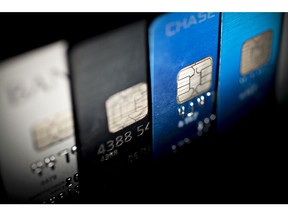
Article content
(Bloomberg) — Australia’s central bank wants merchants to remove surcharging on credit and debit card payments, in a move that could save consumers about A$1.2 billion ($785 million) a year.
THIS CONTENT IS RESERVED FOR SUBSCRIBERS ONLY
Subscribe now to read the latest news in your city and across Canada.
- Exclusive articles from Barbara Shecter, Joe O'Connor, Gabriel Friedman, and others.
- Daily content from Financial Times, the world's leading global business publication.
- Unlimited online access to read articles from Financial Post, National Post and 15 news sites across Canada with one account.
- National Post ePaper, an electronic replica of the print edition to view on any device, share and comment on.
- Daily puzzles, including the New York Times Crossword.
SUBSCRIBE TO UNLOCK MORE ARTICLES
Subscribe now to read the latest news in your city and across Canada.
- Exclusive articles from Barbara Shecter, Joe O'Connor, Gabriel Friedman and others.
- Daily content from Financial Times, the world's leading global business publication.
- Unlimited online access to read articles from Financial Post, National Post and 15 news sites across Canada with one account.
- National Post ePaper, an electronic replica of the print edition to view on any device, share and comment on.
- Daily puzzles, including the New York Times Crossword.
REGISTER / SIGN IN TO UNLOCK MORE ARTICLES
Create an account or sign in to continue with your reading experience.
- Access articles from across Canada with one account.
- Share your thoughts and join the conversation in the comments.
- Enjoy additional articles per month.
- Get email updates from your favourite authors.
THIS ARTICLE IS FREE TO READ REGISTER TO UNLOCK.
Create an account or sign in to continue with your reading experience.
- Access articles from across Canada with one account
- Share your thoughts and join the conversation in the comments
- Enjoy additional articles per month
- Get email updates from your favourite authors
Sign In or Create an Account
or
Article content
The Reserve Bank estimates the aggregate impact on consumer prices from a removal of surcharging would be “very small” at around 0.1 percentage point, according to a consultation paper released in Sydney on Tuesday. The RBA will consult on its proposals for six weeks and then release a conclusions paper at the end of the year. It aims to implement the changes from mid-2026.
Article content
Article content
Article content
Australia is currently at the extreme end of the spectrum in terms of surcharging with Europe, Canada, the UK and the US imposing a ban on debit card charges. Europe and the UK also have a regulatory ban on credit card surcharging.
Article content
By signing up you consent to receive the above newsletter from Postmedia Network Inc.
Article content
Surcharging consumers on everyday goods from morning coffee to dining out and groceries has been a source of frustration for many Australians, especially as the nation has grappled with a cost of living crisis in the aftermath of the Covid-19 pandemic. It is a topic that is frequently raised in parliament.
Article content
The RBA estimates the annual A$1.2 billion in surcharges paid by consumers breaks down to about A$60 per card-user per year.
Article content
The RBA is also proposing to lower the cap on interchange fees paid by business, a move that could save firms around A$1.2 billion. It will also require card networks to publish the fees that they charge in a bid to improve transparency and competition.
Article content
“We think the time has come to address some of these high costs and inefficiencies in the system,” RBA Governor Michele Bullock said in a statement accompanying the paper. “Our goal is a more competitive, efficient, safe payments system for everyone.”
Article content
Advertisement 1

.jpg) 5 hours ago
1
5 hours ago
1
 English (US)
English (US)